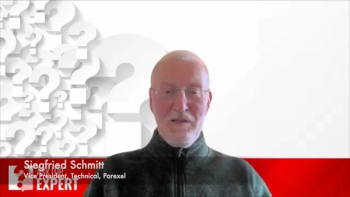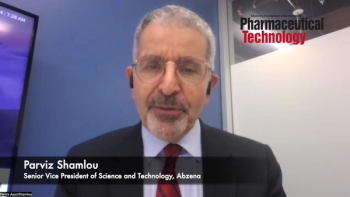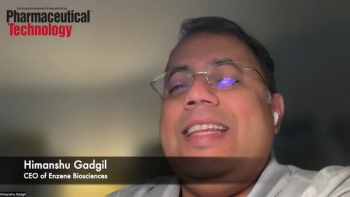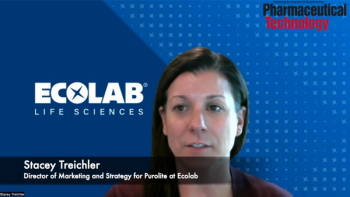
Novo Nordisk will use Korro Bio’s OPERA platform to develop RNA editing candidates for two targets to treat cardiometabolic diseases.
Susan Haigney is lead editor of BioPharm International®.

Novo Nordisk will use Korro Bio’s OPERA platform to develop RNA editing candidates for two targets to treat cardiometabolic diseases.

BioPharm International Editorial Advisory Board

BioPharm International spoke with our Editorial Advisory Board member, Hanns-Christian Mahler, CEO of ten23 health, about his work in the bio/pharma industry and what he sees for the industry’s future.

During a presentation at the PDA/FDA Joint Regulatory Conference, Nicholas Violand of Johnson & Johnson and Paul Palmer of Paul R. Palmer Limited discussed how aging facilities can impact the quality of pharmaceutical products.

CDER’s Jonathan Chapman, senior policy advisor, and Takeda’s Paulien Groll, head of Compliance Excellence, discussed how companies can be proactive with their CAPA strategies instead of reactive, at the 2024 PDA/FDA Joint Regulatory Conference.

In this episode of the Ask the Expert video series, Susan J. Schniepp, distinguished fellow at Regulatory Compliance Associates, and Siegfried Schmitt, vice president, Technical at Parexel, discuss submitting biologics license applications and working with suppliers.

Downstream processes may be streamlined by using automation.

Automation technologies used in the development and manufacture of biopharmaceuticals continue to evolve, providing the potential for reduced costs and time.

BioPharm International® spoke with Zara Bukhari, a PhD scholar at the University of the Pacific, Stockton, CA, and co-author of the peer-review research paper, Biosimilars Drug Development: Advances in Technologies from Molecule Design to Clinical Trials, published in the July/August 2024 issue, about process development for biosimilars.

Contract organizations offer sponsors specialized equipment, capacity, and expertise for testing, manufacturing, and packaging bio/pharmaceutical products.

In the second episode of the Ask the Expert video series, Susan J. Schniepp, distinguished fellow at Regulatory Compliance Associates, and Siegfried Schmitt, vice-president, Technical, at Parexel, discuss the quality requirements needed when incorporating AI in bio/pharmaceutical development and manufacturing.

The company plans to invest approximately €900 million (US$983 million) to expand its peptide platform at its Colorado, US, site and in Europe.

EMA’s CHMP gave positive opinions on a nasal delivery for epinephrine and for a first-in-class medicine to treat pulmonary arterial hypertension, among others, including a biosimilar for treatment of autoimmune diseases.

The seven chosen sponsors will help accelerate development of novel drugs and biologics for rare diseases.

Yoni Tyberg, associate director of the Special Program Staff in the Office of New Drugs, provided an update on efforts to modernize CDER processes.

In the premiere episode of the Ask the Expert video series, Susan J. Schniepp, distinguished fellow at Regulatory Compliance Associates, and Siegfried Schmitt, vice president, Technical at Parexel, discuss the challenges involved in changing an excipient supplier.

A new initiative will advance access to quality medicines and vaccines in Africa.

The guidance document provides information about the agency’s intentions for assigning a goal date for a facility’s inspection readiness under GDUFA.

The companies have completed the expansion and qualification phase and now enter a stand-by phase for five years.

The collaboration and licensing agreement will focus on the discovery and development of RNA exon editing therapeutics.

The agency is evaluating risks associated with the painkiller metamizole. It is also reviewing the risk of secondary malignancies in patients treated with CAR T-cell medicines.

CDER's new program will create discussion around AI and be administered through the Emerging Drug Safety Technology Program.

Reports by USP and FDA detail drug shortage numbers and challenges through 2023.

Pharmaceutical Technology® spoke with Parviz Shamlou, senior vice-president of Science and Technology, Abzena, about the impact of the Biosecure Act on the bio/pharmaceutical industry, as well as the progress of continuous manufacturing in biopharma.

BioPharm International sat down with Himanshu Gadgil, CEO of Enzene Biosciences to discuss the benefits and challenges of continuous manufacturing of biopharmaceuticals.

BioPharm International® spoke with Jeff Clement, executive director of Technical Sales for Development and Manufacturing Group at PCI Pharma Services, about the challenges and benefits of incorporating robotics into aseptic manufacturing

BioPharm International® spoke with Stacey Treichler, senior director of Marketing and Strategy for Purolite at Ecolab, about the impact of advanced therapies, new innovations, and sustainability on the biopharmaceutical industry.

Enzene's new division will provide end-to-end integrated discovery services.

Bkemv (eculizumab-aeeb) is the first interchangeable biosimilar to Soliris (eculizumab) to treat paroxysmal nocturnal hemoglobinuria and atypical hemolytic uremic syndrome.

The partnership will create therapeutic assets and new discovery platforms and potentially reshape drug discovery.